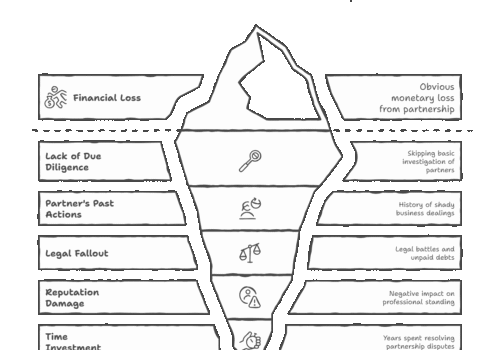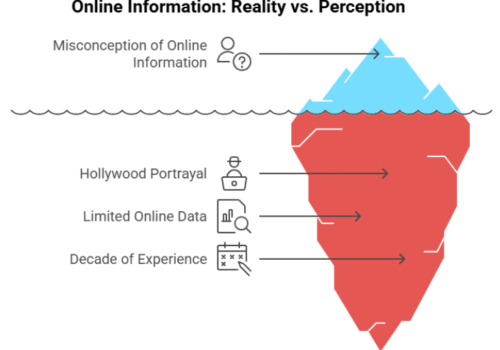Reasons You Might Fail a Background Check (and How to Avoid It)

Ever get that slightly queasy feeling when you think about a background check? You know, that knot in your stomach? You are definitely not alone. I’ve seen countless people wrestling with anxiety when their past is about to be gone over with a fine-tooth comb, especially when a new job is on the line; it’s very common. As someone who has been working in and around background checks for a while, I’ve helped individuals navigate this often-confusing process. I’ve learned a few things. And I’ve helped them ensure their past doesn’t unfairly derail their future – because sometimes things just aren’t fair.
In this article, I’m going to share my experience; my insights, really, are into the most common reasons some folks hit snags on a background check. It’s always a mix of the obvious and the surprising! I’ll also cover what you can proactively do if you’re concerned about your results and, even more importantly, how to ensure accuracy in your employment screening. Consider this your… well, your hopefully helpful guide to navigating the somewhat convoluted world of background checks. I promise actionable, expert-backed advice that you can actually use immediately.
Understanding Background Checks: What Are They and Why They Matter
In the simplest terms, a background check is essentially a process of verifying information about an individual. It is what it sounds like. This screening process involves systematically reviewing different records and databases to confirm things like someone’s identity, general history, and specific qualifications for a role. We’re talking everything here, I think, from criminal history all the way to employment verification, and even education, potentially.
Different kinds of background checks exist, as you might expect. You have your standard verification of education, but also possibly credit check reports, and more. These checks are super critical for organizations. I mean, think about it: they ensure a safe and secure environment for existing employees, residents, and even volunteers, and for others it’s as simple as validating a resume. They also play a vital role in legal compliance. Not only that, but in a broader sense, they help organizations protect themselves from, well, potential liability, and also promote responsible decision-making overall. So, it’s a risk-management tool, yeah, but I also see them as a tool used to promote responsibility and safety overall.
Top Reasons for Failing a Background Check
Okay, “failed” background check is kind of a loaded term. It’s better thought of as a background check presenting adverse findings to the organization requesting it. It definitely can halt an opportunity; that’s reality. While some failure reasons seem pretty obvious, there are frequent misunderstandings that crop up. Here’s a breakdown of the most common reasons I’ve personally come across:
Criminal Record
One of the absolutely most frequent, I’d even say the most frequent, reasons is the presence of any kind of criminal record. Even a seemingly minor offense, something that seems trivial in hindsight, can actually unexpectedly raise concerns for employers. Felony convictions, are, of course, going to be a major red flag. Still, even some misdemeanor convictions or pending charges, even just an arrest record, can unfortunately impact the outcome of your search. It is really important to look into expungement in these circumstances wherever it is possible.
Employment History Discrepancies
Inaccuracies, outright errors, or even just confusing inconsistencies in your employment history are another common pitfall that I’ve spotted time and again. Resume fraud, anything from inflating job titles, to providing even slightly inaccurate dates, or outright fabrication? It can be detected pretty easily, it turns out. Even more subtle things, like an unexplained job gap or a particularly negative reference from a former employer can unfortunately raise red flags almost immediately.
Education Verification Issues
Similar to employment history, providing false or, again, even slightly misleading information about your education – and people do it – can be surprisingly detrimental in the long run. Degree fraud, outright claiming to have a degree you actually didn’t earn or submitting fake, doctored transcripts, is also surprisingly easily verifiable. And, yeah, it will most likely lead to a failed check, understandably.
Credit History Problems
While not always a direct factor, a demonstrably poor credit history can impact your chances. This is especially true, though, for positions that involve any kind of financial responsibility. Things like significant debt, any prior bankruptcy filings, or documented history of financial mismanagement in general, can be legitimately concerning to potential employers in certain industries. Credit checks are frequently a sticking point, though; they should be directly related to the job function.
Driving Record Issues
For jobs that require driving as part of the actual core functions, a problematic driving record is, predictably, a major issue. Multiple traffic violations in a short period of time, a DUI conviction, even a license suspension, can unfortunately all lead to immediate disqualification; that’s especially true for positions that involve actually operating a vehicle. This is just basic risk.
The Importance of Honesty and Disclosure
In my professional experience, honesty is hands down, and I would say unequivocally, always the best policy when it comes to background checks. I have seen this happen time and time again. And yes, sometimes it is difficult! Attempting to actively hide relevant information or actively misrepresenting data almost always backfires spectacularly and can seriously, sometimes irrevocably, damage your credibility. I would say to consider demonstrating active transparency and consistently disclose any potential issues upfront. Don’t hope it won’t come up; just talk about it. This is truly the most effective form of communication.
The Downside of Lying
Lying on your application, any attempts at misleading information, or fibbing during the interview process not only demonstrably shows a lack of integrity. It can be grounds for immediate disqualification if the employer finds out, even if the underlying issue itself wasn’t originally going to be a true deal-breaker. It’s the lying they worry about. That’s what I would certainly worry about…
Be Proactive
What if, instead of trying to actively conceal something that realistically might surface, what if you considered being upfront from the get-go with the employer? Then try clearly and concisely explaining the relevant situation. Whenever possible, provide supporting documentation that demonstrably shows you’ve taken responsibility for your prior actions; for example, provide some proof that you completed a court-mandated rehabilitation program, attach expungement orders, or even just draft well-written letters of explanation, if that’s what’s possible. This reveals, that you have maturity and a willingness to proactively address past mistakes. That can often, though not always, be viewed favorably. That, simply put, is the background check truth.
What to Do If You Think You Might Fail
Okay, so you’re concerned now. You’re thinking about what might potentially show up on your background report, right? You really don’t have to just sit there and wait anxiously for the worst. There are proactive steps that you are able to take right now to potentially mitigate some of the more negative fallout.
Obtain a Copy of YOUR Background Report
The first, and arguably most important, step is to obtain a copy of your own background report well in advance. This empowers you to see exactly what kind of information is out there in the report and also, critically, to help you identify any potential problems long before your possible employer comes across them. Being able to really understand your actual check history is absolutely vital, I think.
Address Issues Promptly
Once you finally have a copy of your report, carefully review, almost line-by-line, for any inconsistencies, outright inaccuracies, or outdated information. If you do actually find genuine errors, you should systematically gather all documentation to back up your particular claim. Also, immediately start disputes with the relevant reporting agencies. Address errors proactively, as it does demonstrate responsibility and, can, critically, prevent potential surprises during a potential employer’s background check.
Correcting Errors and Challenging Inaccurate Information
It’s absolutely essential to remember that no background checks are always perfect. Errors can and do occur. If that happens, you have the legal right to formally dispute background check results and also, importantly, to actively correct any demonstrable errors. Successfully taking these kinds of actions can result in a significantly fairer and more accurate reading.
Gather Evidence
If you clearly identify some inaccurate information on your report, the first critical step is to compile any and all relevant documentation that decisively and persuasively supports your claim. That might include formal court records, verified employment records, or validated educational transcripts – whatever it takes to definitively prove that the information currently on the report is incorrect.
Follow Dispute Procedures
The next step is to formally challenge the report with the background agency. The Fair Credit Reporting Act (FCRA) outlines the required steps and procedures for disputing questionable information on your actual background check. You’ll typically need to send a formal, written dispute to the specific consumer reporting agency that actually generated the report. Your carefully written explanation should clearly explain the exact error you have identified. The written explanation should include copies of all carefully collected supporting documentation. The agency then has something of a set amount of time, usually around 30 days, to thoroughly investigate your claim. They can, if you’re provably correct in your claim, correct the verifiable underlying error. It’s really important to fully understand the dispute process in detail. It is just to ensure that you have a fair chance to respond to factual inaccuracies.
Knowing Your Rights
Understanding your basic legal rights is absolutely crucial when facing background checks. Various federal laws and guidelines exists and protect you; it is absolutely, legally, from unfair or any kind of discriminatory practices. The Fair Credit Reporting Act (FCRA) and the Equal Employment Opportunity Commission (EEOC) play key roles in actively regulating how background checks are used in practice.
FCRA Protections
The FCRA is a vital federal law that is designed to promote accuracy, essential fairness, and the appropriate privacy of personal information included in all consumer reports, including those generated by background checks. It gives you the right, for example, to access your report, to dispute provable inaccuracies, and, critically, to be personally notified if information included in your generated report is actually used against you in some tangible way.
EEOC Guidelines
The EEOC is tasked with enforcing federal laws that prohibit discrimination in employment settings of all kinds. While employers are certainly allowed to use background checks as part of the hiring process, the EEOC does enforce guidelines to ensure all such protocols are not used in a discriminatory manner in practice. For example, employers should generally avoid what I would call blanket policies. These can automatically and unfairly disqualify perfectly good individuals with minor criminal records, without carefully giving due consideration in each case to the specific nature of the actual offense, the measurable long period of time that has elapsed, and, of course, the actual requirements of the job itself. That is an incredibly important rule to understand.
Navigating the often mysterious and potentially anxiety-inducing world of background checks can feel genuinely daunting. However, with the right knowledge carefully gleaned and thorough preparation completed, you can definitely approach this stressful process with tangible confidence. Always remember that proactive honesty, comprehensive preparation, and, critically, a complete understanding of your rights and potential remedies are the keys. A proactive and systematic approach is absolutely essential and can make a potentially enormous difference in the final outcome.
Ultimately, by staying fully informed; by taking measured and carefully considered steps to proactively address any and all potential issues; and by clearly understanding your actual legal rights, you can measurably increase your chances of actually succeeding in this kind of process. A background report check does not have to be a seemingly inevitable source of stress and anxiety. In fact, if you are seeking actually genuine professional guidance or are simply seeking personalized advice tailored to your particular situation, you should not hesitate to reach out immediately for a no-obligation consultation.
Share this article with someone, anyone, that you think might usefully benefit from the core information the article itself contains.



